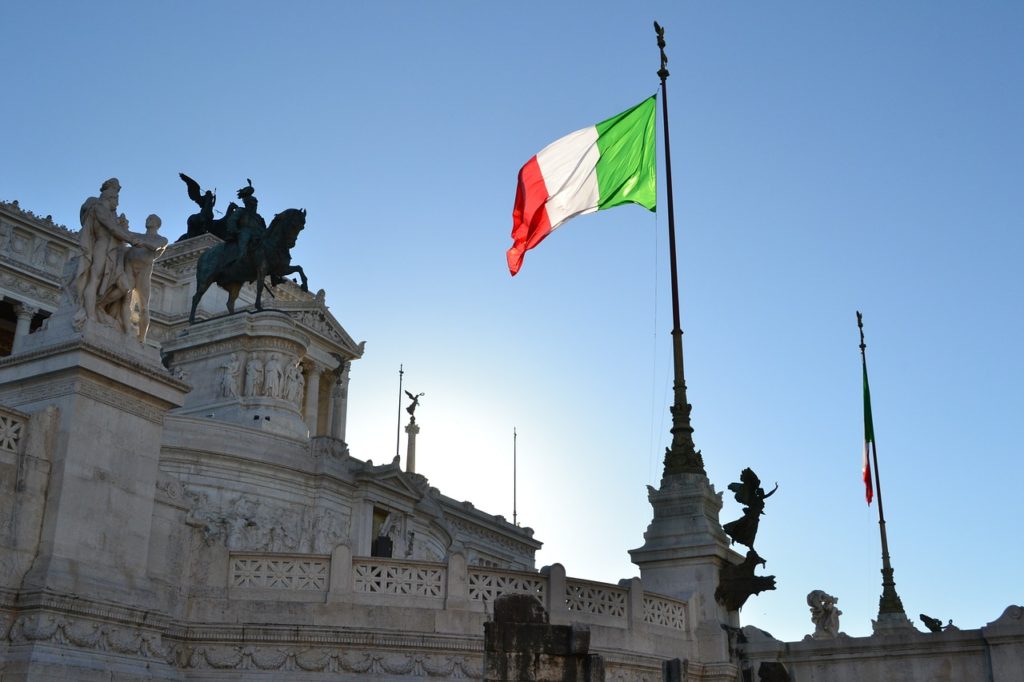Politics in Italy Posted by Bridgette on Nov 6, 2020 in Culture, Italian Language
Ciao a tutti!
The world and all of us are watching the US elections closely, con ansia1with anxiety to get the final results. If you go to the Italian news site La Repubblica for example, the main page looks exactly like one from the US – full of articles about our election. To check out their reporting, click here.
Given l’atmosfera politica tesa2the tense political atmosphere here in the US these last couple of days… what better topic than to instead talk about politica italiana3Italian politics?
Italy is a democrazia rappresentativa4democratic republic and has been since 1946. It is known as the Repubblica Italiana5Italian Republic. The ‘First Republic’ lasted until 1992 when a series of scandals broke out amongst the major political parties. After some major changes, Italy is now in their ‘Second Republic.’
The current president is Sergio Mattarella who is capo dello stato (head of state), but this is mostly a ceremonial position. Some main duties of the president are naming the prime minister (though this is in conjunction with a general election), calling for elections, calling referendums, and officially putting laws into effect (which are created and passed by others).
There are three branches of power in Italy: executive, legislative, and juridical.
The executive power is in the hands of the Consiglio dei Ministri (Council of the Ministers), presided over by the Presidente del Consiglio (Prime Minister). The current Presidente del Consiglio is Giuseppe Conte.
The ministers are responsible for executing laws and other political decisions. This is usually done by presenting bills to parliament.
The legislative power belongs to parliament, whose main job is to create laws.
Parliament can also make amendments to the constitution (although it isn’t easy to do so in Italy), and is responsible for reviewing and guiding the government.
Meanwhile, the judiciary power belongs to judges, who are responsible for implementing the laws passed by parliament. They are not elected but are chosen based on exam results and internal commissions, and they serve for life.
The parliament consists of two houses:
Camera dei Deputati – Chamber of Deputies
The Chamber of Deputies has 630 members and they are elected to 5 year terms. An Italian citizen who wants to run for election in the Camera dei Deputati must be at least 25 years old.
Senato della Repubblica – Senate of the Republic
The Senate has 315 elected members, who must be at least 40 years old. They also are elected to 5 year terms.
Both sections of parliament have equal power and they are the ones who elect the president. The president is elected to a 7 year term, so that the same parliament won’t be able to re-elect them to a second term. Only one Italian president has ever been elected to a second term- Giorgio Napolitano in 2013.
Per votare alle elezioni6to vote in the elections an Italian citizen must be 18 years old for the Camera dei Deputati and 25 years old for the Senato della Repubblica.
Conoscete la politica italiana? Are you familiar with Italian politics? Fatemi sapere!7Let me know
- 1with anxiety
- 2the tense political atmosphere
- 3Italian politics
- 4democratic republic
- 5Italian Republic
- 6to vote in the elections
- 7Let me know

Build vocabulary, practice pronunciation, and more with Transparent Language Online. Available anytime, anywhere, on any device.





Comments:
Leila Sullivan:
It is unfortunate that these articles are not published as dual language Italian-English pieces. They would be much more helpful for learners like myself if I could try reading first in Italian and then checking the translation. Please consider this different approach.
Joan Engelhaupt:
Very interesting! Thank you for posting. Do I understand you correctly that the Italian people do not directly elect their president? I understand that with our Electoral College, we in the U.S. do not either, but it feels more direct than what I understood to be the Italian process you described.
Descoutures Marie France:
Very interesting. But Why you don’t write it in Italian?
KarenG:
Who do the Chamber of Deputies and the Senate of the Republic represent? Other than age requirements, must they be from certain regions, like in the US Senate for example, only two allowed per state?